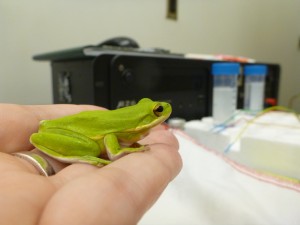Animals show great plasticity in their communication systems – both in production and behavioral response to communication signals. Communication can change seasonally, with reproductive condition (hormones), and as animals gain behavioral experience. Traditionally, this plasticity has been attributed to motivational changes. However, recently we have begun to recognize that plasticity in the auditory system might also play a role in communication plasticity.
Behavioral Experience and Sensory Plasticity
 In my post-doctoral work at Georgia State and during my time at Vassar I have investigated how experience with communication signals influences auditory system response to those signals. For instance, females that have heard the advertisement call of a male many times may not respond as strongly to that call. This could be due to reduced neural activity in the auditory pathway. On the other hand, social signals may have a “priming” effect on auditory processing, such that hearing calls makes one more receptive of the calls in the future. To explore this idea we gave individuals different communication experiences and then measured their neural responses to those signals using the expression of an immediate early gene called egr-1 or zenk in the brains of green treefrogs. Immediate early genes are expressed when a neuron responds to a stimulus, so we can use these as markers of neural activity. We have published some of this work in the Journal of Experimental Biology. We have also used auditory evoked potentials to determine whether this plasticity occurs physiologically at the periphery. This work has been published in the Journal of Experimental Biology and Proceedings of the Royal Society B. In collaboration with undergraduate students in my lab and Walter Wilczynski at Georgia State University, we are continuing to work on these questions in the green treefrog. Prospective students should know that this work typically occurs during the summer and not during the school year.
In my post-doctoral work at Georgia State and during my time at Vassar I have investigated how experience with communication signals influences auditory system response to those signals. For instance, females that have heard the advertisement call of a male many times may not respond as strongly to that call. This could be due to reduced neural activity in the auditory pathway. On the other hand, social signals may have a “priming” effect on auditory processing, such that hearing calls makes one more receptive of the calls in the future. To explore this idea we gave individuals different communication experiences and then measured their neural responses to those signals using the expression of an immediate early gene called egr-1 or zenk in the brains of green treefrogs. Immediate early genes are expressed when a neuron responds to a stimulus, so we can use these as markers of neural activity. We have published some of this work in the Journal of Experimental Biology. We have also used auditory evoked potentials to determine whether this plasticity occurs physiologically at the periphery. This work has been published in the Journal of Experimental Biology and Proceedings of the Royal Society B. In collaboration with undergraduate students in my lab and Walter Wilczynski at Georgia State University, we are continuing to work on these questions in the green treefrog. Prospective students should know that this work typically occurs during the summer and not during the school year.
Hormones and Seasonal Plasticity
In a paper we published in Proceedings of the Royal Society of London B, we showed that the auditory processing of songbirds shows seasonal plasticity – and that this plasticity is sex specific (females change but males don’t!). But what mechanisms regulate this sensory plasticity? Some evidence suggests that circulating hormones (estrogen or testosterone) could be responsible for seasonal changes in auditory processing. Researchers have found that there are receptors in the inner ear of zebra finches for hormones and that white-crowned sparrows show changes in their frequency sensitivity when implanted with hormones. We have investigated these effects in house sparrow using AEPs.



